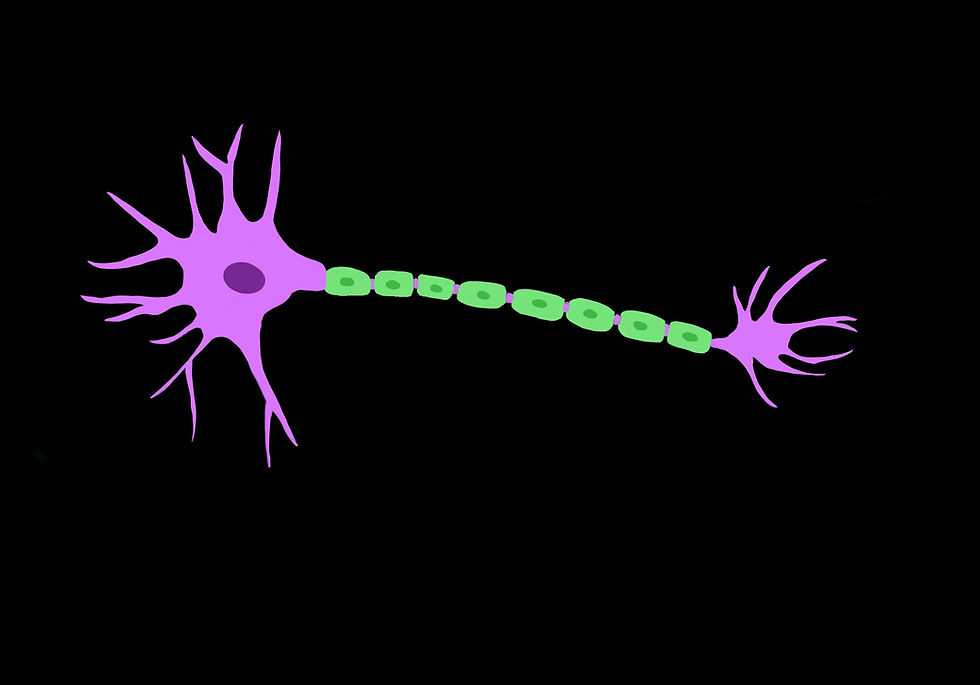Neuron Architecture in Sleep
- Science Holic
- Jan 7, 2024
- 2 min read
Author: Lucy Chen
Editors: Jaylen Peng and Kyra Wang
Artist: Esther Chen
Sleep is crucial in maintaining brain health and function. During this vital period of rest, neurons undergo significant changes, contributing to various cognitive processes. There are substantial changes in the structure of neurons during sleep, involving the shrinking of synapses and the retraction of dendritic spines.

One essential change is synapse reorganization, modifying connections between neurons. This process results in the strengthening and refinement of neural networks. Research has shown that this reorganization during sleep is crucial in improving memory and cognitive abilities. Furthermore, the formation of new synapses during sleep contributes to the strengthening of neural connections. As new synapses are created, the brain becomes more interconnected, enhancing communication between different regions. This improved connectivity facilitates information integration and the coordination of cognitive processes. It also enables the brain to form new associations and insights, leading to creative thinking and problem-solving.
In addition to forming new synapses, enhancing existing synapses during sleep further boosts neural connections. This process involves strengthening the connections between neurons, making them more efficient in transmitting signals. As a result, the brain's communication network becomes more robust and reliable, improving overall cognitive function.

The brain's connections shrink during sleep, resulting in a reduction of overall brain activity. Studies have shown that this process, known as synaptic scaling, helps restore the balance of neural activity and maintain the proper functioning of the brain. The shrinking of synapses during sleep allows for more efficient consolidation of information and removes unnecessary or irrelevant connections, facilitating better cognitive performance and memory consolidation upon waking. Furthermore, research reveals that sleep plays a vital role in maintaining and repairing neuronal circuits, essential for healthy brain function.
Understanding these alterations in neuron structure during sleep may provide valuable insights for developing new treatments for neurological diseases. These changes in neuron structure during sleep significantly affect individuals with neurological diseases. Sleep plays a vital role in removing the toxic waste products accumulated in the brain. For example, interventions that promote quality sleep and support synapse reorganization may help improve memory and cognitive abilities in patients with Alzheimer's disease or traumatic brain injury. Prioritizing quality sleep is essential for promoting brain health and improving outcomes for individuals with neurological disorders. This highlights the importance of adequate and quality sleep for maintaining and promoting brain health. Understanding these intricate changes in neuron structure during sleep can have profound implications for therapeutic interventions in neurological disorders. By further exploring and harnessing the benefits of sleep-induced neuronal changes, researchers may uncover new avenues for developing treatments that target and optimize brain function, benefiting individuals with neurological conditions.
Citations:
Cherry, Kendra. “Sleep and The Amazing Shrinking Synapse | Psychology Today.”
Verywellmind, 8 Nov. 2022, www.psychologytoday.com/intl/blog/sleepless-in-
Cirelli, Chiara. “Sleep and Synaptic Changes.” Current Opinion in Neurobiology, U.S.
National Library of Medicine, Oct. 2013,
LiveScience, and Christopher Wanjek. “Sleep Shrinks the Brain--and That’s a Good Thing.”
Scientific American, 20 Aug. 2021, www.scientificamerican.com/article/sleep-shrinks-
“The Sleeping Brain.” Picower Institute, 14 Sept. 2023, picower.mit.edu/news/sleeping-



Comments